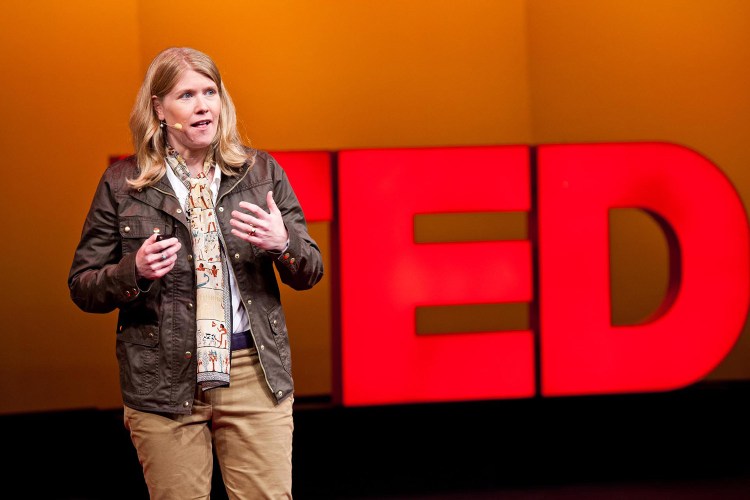Sarah Parcak, a Maine native with the unique title of “space archaeologist,” has won the prestigious 2016 TED Prize, an award that the organization known for its conferences and TED Talks hands out each year to an extraordinary individual with a big, bold idea.
The prize comes with $1 million to help make that idea a reality.
Parcak grew up in Bangor and is now an anthropology professor at the University of Alabama in Birmingham, where she founded the Laboratory for Global Observation. Like a high-tech Indiana Jones, she has gained international recognition for using infrared technology and satellite imagery to identify undiscovered archaeological sites in Egypt and other parts of the Middle East, and to track changes at existing sites.
For instance, Parcak used satellite images to track the looting of burial tombs at Lisht, an ancient Egyptian site south of Cairo that flourished between 2030 and 1640 B.C. The number of looted tombs spotted from space was 515 in 2011, but had increased to 690 in 2012, she told the New York Times in a recent interview.
Parcak is now using satellite data to locate looted archaeological sites in northern Iraq and Syria and track the destruction wrought by the Islamic State, which is destroying important historic sites like the ancient city of Palmyra, “bit by bit,” Parcak said in a statement.
“The last four and half years have been horrific for archaeology. I’ve spent a lot of time, as have many of my colleagues, looking at the destruction,” she said. “This prize is not about me. It’s about our field. It’s about the thousands of men and women around the world, particularly in the Middle East, who are defending and protecting sites.”
Looting of historic sites has long been a problem in the Middle East, but the issue is now at the forefront because it’s suspected that black market sales of looted artifacts is helping fund terrorist groups like ISIS, Parcak said.
“Clearly ISIL and other groups are looting sites in Syria and Iraq, but in terms of how the objects are getting out of the country and how much money they’re generating, that’s something we don’t know yet. We’re really at the beginning to do research on it,” she said. “It’s certainly getting more attention, but I certainly wish it wasn’t for those reasons.”
Parcak has been interested in Egypt ever since she was a little girl. “If you talked to any Egyptologist, they’d say something about being interested in Egypt from a young age, for no rhyme or reason,” she said. “Bangor is nice, but there are no pyramids and not much sand.”
Now a TED Fellow and a National Geographic Society Archaeology Fellow, Parcak said a family connection helped her decide to pursue her passion for Egypt and archaeology.
Parcak’s grandfather, Harold Young, was a forestry professor at the University of Maine and “one of the pioneers of using aerial photography for forestry,” she said.
“While growing up I’d hear him talking about the power of images for forestry. It’s the reason I took my first remote sensor course as an undergraduate at Yale. Because I always wondered what Grampy did.”
Parcak is also the CEO of SpectralGlobe Technologies, which specializes in using remote sensing technologies to provide innovative landscape services.
How Parcak will use the $1 million is a secret. TED’s news release announcing Parcak’s award says only that she has a “bold, ambitious wish to help uncover and protect the world’s hidden cultural heritage.”
Parcak is scheduled to give a new TED Talk on Feb. 16 in Vancouver in which she’ll share her project idea.”We can use this TED Prize to get the world involved,” she said.
Send questions/comments to the editors.



Success. Please wait for the page to reload. If the page does not reload within 5 seconds, please refresh the page.
Enter your email and password to access comments.
Hi, to comment on stories you must . This profile is in addition to your subscription and website login.
Already have a commenting profile? .
Invalid username/password.
Please check your email to confirm and complete your registration.
Only subscribers are eligible to post comments. Please subscribe or login first for digital access. Here’s why.
Use the form below to reset your password. When you've submitted your account email, we will send an email with a reset code.